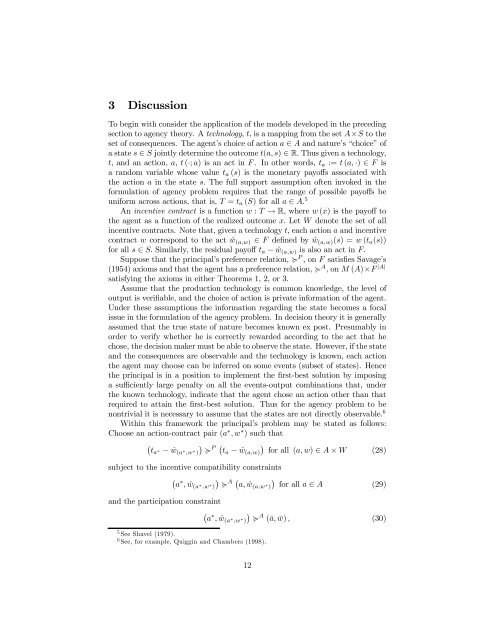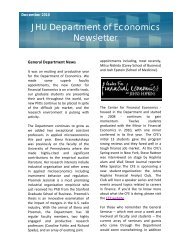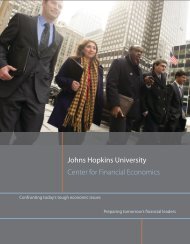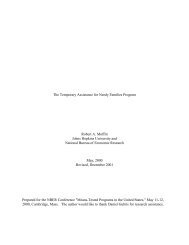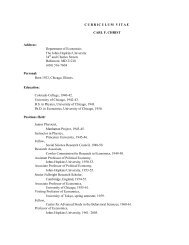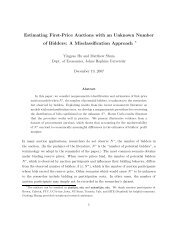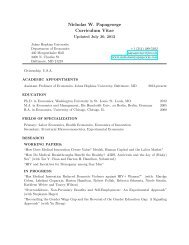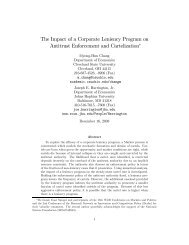Subjective Expected Utility Theory with Costly Actions - Economics ...
Subjective Expected Utility Theory with Costly Actions - Economics ...
Subjective Expected Utility Theory with Costly Actions - Economics ...
Create successful ePaper yourself
Turn your PDF publications into a flip-book with our unique Google optimized e-Paper software.
3 Discussion<br />
To begin <strong>with</strong> consider the application of the models developed in the preceding<br />
section to agency theory. A technology, t; is a mapping from the set A£S to the<br />
set of consequences. The agent’s choice of action a 2 A and nature’s “choice” of<br />
astates 2 S jointly determine the outcome t(a; s) 2 R: Thus given a technology,<br />
t; andanaction,a; t (¢; a) is an act in F . In other words, ta := t (a; ¢) 2 F is<br />
a random variable whose value ta (s) is the monetary payo¤s associated <strong>with</strong><br />
the action a in the state s: The full support assumption often invoked in the<br />
formulation of agency problem requires that the range of possible payo¤s be<br />
uniform across actions, that is, T = ta (S) for all a 2 A: 5<br />
An incentive contract is a function w : T ! R, wherew (x) is the payo¤ to<br />
the agent as a function of the realized outcome x: Let W denote the set of all<br />
incentive contracts. Note that, given a technology t; each action a and incentive<br />
contract w correspond to the act ^w (a;w) 2 F de…ned by ^w (a;w)(s) =w (ta(s))<br />
for all s 2 S: Similarly, the residual payo¤ ta ¡ ^w (a;w) is also an act in F:<br />
Suppose that the principal’s preference relation, < P ; on F satis…es Savage’s<br />
(1954) axioms and that the agent has a preference relation, < A ; on M (A)£F jAj<br />
satisfying the axioms in either Theorems 1, 2, or 3.<br />
Assume that the production technology is common knowledge, the level of<br />
output is veri…able, and the choice of action is private information of the agent.<br />
Under these assumptions the information regarding the state becomes a focal<br />
issue in the formulation of the agency problem. In decision theory it is generally<br />
assumed that the true state of nature becomes known ex post. Presumably in<br />
order to verify whether he is correctly rewarded according to the act that he<br />
chose, the decision maker must be able to observe the state. However, if the state<br />
and the consequences are observable and the technology is known, each action<br />
the agent may choose can be inferred on some events (subset of states). Hence<br />
the principal is in a position to implement the …rst-best solution by imposing<br />
a su¢ciently large penalty on all the events-output combinations that, under<br />
the known technology, indicate that the agent chose an action other than that<br />
required to attain the …rst-best solution. Thus for the agency problem to be<br />
nontrivial it is necessary to assume that the states are not directly observable. 6<br />
Within this framework the principal’s problem may be stated as follows:<br />
Choose an action-contract pair (a ¤ ;w ¤ ) such that<br />
¡ ta ¤ ¡ ^w (a ¤ ;w ¤ )<br />
¢ P<br />
< ¡ ¢<br />
ta ¡ ^w (a;w) for all (a; w) 2 A £ W (28)<br />
subject to the incentive compatibility constraints<br />
¡ ¢ ¤ A<br />
a ; ^w(a ¤ ;w ¤ ) < ¡ ¢<br />
a; ^w (a;w ¤ ) for all a 2 A (29)<br />
and the participation constraint<br />
¡ ¢ ¤ A<br />
a ; ^w(a ¤ ;w ¤ ) < (¹a; ¹w) ; (30)<br />
5 See Shavel (1979).<br />
6 See, for example, Quiggin and Chambers (1998).<br />
12


